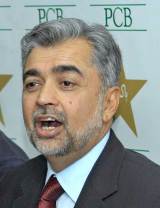
|

'We have already started aligning our policy to the WADA code and we will make sure that this process happens as quickly as possible now' - Ashraf
© Getty Images
|
|
Nasim Ashraf, chairman of the Pakistan Cricket Board (PCB), has reiterated Pakistan's commitment to a zero-tolerance policy on doping in the wake of criticism from Percy Sonn, the ICC president, over the board's handling of the doping cases of Shoaib Akhtar and Mohammad Asif.
The bowlers were initially handed bans by a committee set up to investigate their cases, only for the judgment and punishments to be totally overturned by a subsequent appeals committee. The findings of the appellate committee raised questions about the PCB's anti-doping regulations and it prompted Sonn to remark, in an official statement, that "the judgment highlights inconsistencies in the PCB's anti-doping processes and regulations."
But Ashraf, speaking to Cricinfo, defended the role of the PCB in the matter. "We remain totally committed to a zero-tolerance policy on doping. I cannot stress that enough. But the verdict of both commissions also has to be honoured and respected. The board has nothing to do with the commissions. They were completely independent; they proceeded and arrived at their conclusions in an open and transparent manner."
What appears to be a particular concern is the seemingly wide divergence between the PCB's anti-doping regulations and those of the ICC and WADA (World anti-doping agency). As a result of the disparity, the original committee found both players guilty and punished them based on ICC and WADA regulations but the appellate committee exonerated them of all charges under PCB regulations, further arguing that the first committee was wrong to have referred to an international code in the first place.
Ashraf explained that the discrepancy existed because the PCB had framed their policy in 2002, much before the ICC adopted the WADA code. And in response to Sonn's call for member countries to align their regulations with those of the ICC and WADA, Ashraf said the process had already begun in Pakistan.
"We have already started aligning our policy to the WADA code and we will make sure that this process happens as quickly as possible now. Our policy should be as close to possible as their's. Pakistan is one of only four members that has an active anti-doping policy at the moment and ours was framed back in 2002."
Though drugs have crept into cricket through a number of incidents in recent years - international players have been fined for smoking marijuana and first-class cricketers banned for more serious abuse - Shoaib and Asif are the only players to test positive for a banned anabolic steroid. Shane Warne tested positive for a diuretic which is used to mask the presence of steroids and was banned for a year.
And Ashraf reasoned that from this incident, there was an opportunity for cricket to learn as well. "This unfortunate incident has created mass awareness of doping issues in cricket. That is something we can all, as a sport, now learn from and try and prevent such cases from occurring again. This is a good lesson for all players because the responsibility ultimately is theirs for what goes into their body.
"We will also take greater pains to ensure that all players are properly educated about doping matters and fully understand the issues at stake. And we will do this while being completely committed to zero tolerance on doping. That is something the board, and I personally, will not compromise on. I believe in zero tolerance and I will implement this belief."
Osman Samiuddin is Pakistan editor of Cricinfo
